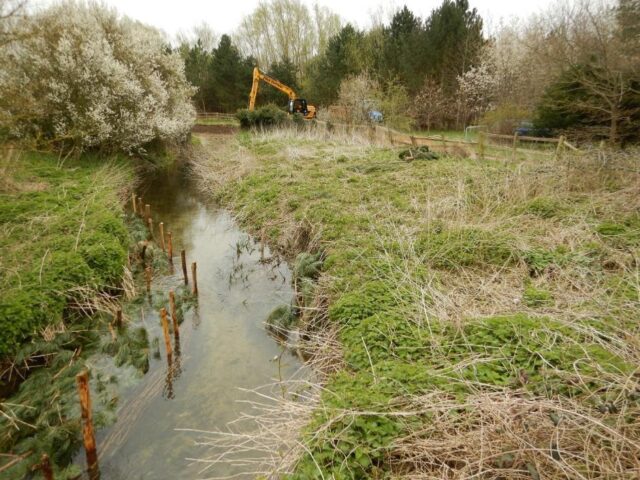Major work has just been completed by the Wild Trout Trust working with the Babraham Research Campus on 1km of the River Granta in South Cambridgeshire. The work, which was funded by the Environment Agency, aims to improve habitat for wildlife, provide a better view of the river for walkers and improve the ability of the river to cope with floods and droughts.
Photos of the project before, during and immediately after the work are available here.
Chris Chapman, Director of Campus and Facilities at the Babraham Research Campus said, “This work came about further to an Advisory Visit by the Wild Trout Trust, and we realised that we could work together for the good of the river. The Campus estate is a beautiful natural asset, which we are dedicated to maintaining, preserving, and enhancing. The river is a major asset which is enjoyed by those that work here as well as the local community. We are very much committed to taking care of this precious chalk stream and were very pleased to collaborate with the Trust to enable this work to go ahead.”
Rob Mungovan, Wild Trout Trust Conservation Officer, said: “Taking care of these chalk rivers is important given the wealth of wildlife that they support. The clean water provides great habitat for wild brown trout and kingfishers can be seen flying along the river.”
Alex Malcolm Environment Agency Fisheries specialist said — “It has been fantastic to be able to fund this project delivered by our partners at the Wild Trout Trust. Chalk streams are truly special water environments providing important habitats for a range of wildlife. The works carried out will ensure the river can thrive not only by allowing it to react more naturally during extremes like flood and drought but also protecting fish, invertebrates and plants that are reliant on this amazing habitat. For fish, these improvements will enhance spawning and cover, and the improved river flow will be attractive to dace, trout and minnows.”
The reach of river is accessible from a public footpath, with the Babraham Research Campus kindly allowing access to its land through permissive paths. Balancing the need of access for people and dogs and providing quiet areas of wildlife habitat is an important part of this project. Some areas have been screened off for wildlife by laying thorny shrubs across the banks, whilst others have been made more accessible and attractive through the placement of clean gravel where previously there were muddy margins.
The riverbed has been carefully dug in places to lift gravel, which has been re-distributed and topped with clean gravel to provide new spawning riffles for brown trout and minnows. The banks have been lowered to allow floodwater into areas of woodland which should hold water, allowing it to soak back into the ground to aid recharge of the chalk aquifer. Woody material, from large trees to twiggy brash, have been introduced to the river to provide habitat for fish, birds and insects as well as to ‘slow the flow’ of flood waters.
The work was funded by the Environment Agency in a drive to see rivers managed more holistically for flood management and habitat gain. The Granta has suffered in recent dry years but also presents a flood risk to some properties.
The River Granta is a chalk river that rises from springs above Bartlow. The river flows for ~29km through Linton, the Abingtons and Babraham before joining the River Cam at Stapleford. There are a number of community groups who are active in the river’s conservation. It is hoped that this phase of work will act as a catalyst to show what can be done for Cambridgeshire’s chalk rivers.
